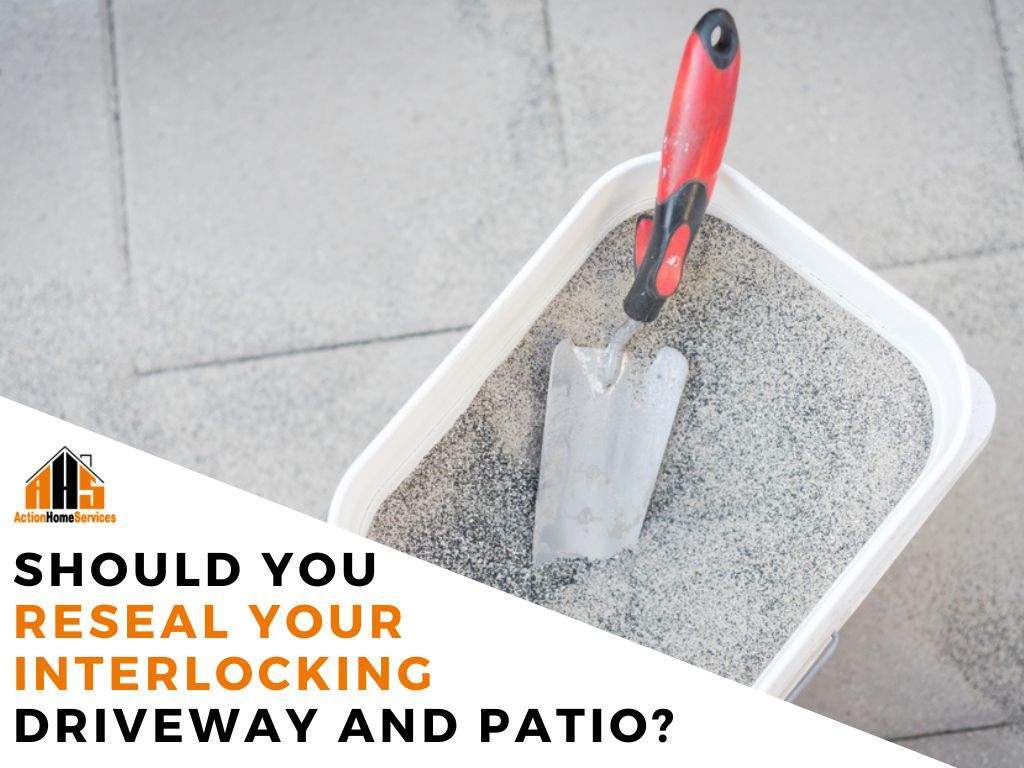
Benefits of Resealing Your Interlocking
If you have an interlocking stone driveway, patio, walkway, or pool deck, you’ve invested in your property and care about how it looks. It’s a good choice because, although interlocking stones and pavers cost a little bit more upfront, they are easier and less expensive to maintain over time. But, to keep your interlocking pavers and stones looking at their best, you should have a regular maintenance routine that includes cleaning, repair, re-sanding (preferably with Polymeric sand), and (and this is the topic of this post) resealing.
There are several reasons why resealing your interlock is beneficial. It protects it, which lessens deterioration and wear and tear. It also preserves its aesthetic appeal, extending its lifespan. It optimizes the return on your investment. And it makes ongoing maintenance easier. But, the reasons for resealing don’t fall nicely into each category. Protecting your interlock from stains, for example, preserves the look of the stones, helps to make clean-up and maintenance more manageable, and optimizes your return on investment. So I have put things in no particular order.
Why You Should Reseal Your Interlocking Stone?
In Toronto, we face a vast diversity in climatic conditions. Sealing your interlock helps to protect it from the effects of the changing weather, whether it's the brutal summer sun, torrential rains, high winds, ice, or snow. The summer sun can fade the colour of your interlock. Winter weather can bring on the use of paver-unfriendly salt. Wind and heavy rains can affect the sand between pavers. By resealing the interlock, you will have done everything possible to lessen the impact that weather can have.
It also helps to reduce algae and mould, which look unsightly and can leach minerals from the pavers that can cause them to deteriorate. It also deters insects and ants from making the cracks between your pavers their home and helps to prevent weeds from taking hold.
Resealing your pavers protects them from stains. The usual culprits include oil and grease, salt, organic debris, and rust. Pressure washing your interlock usually removes the stains. If not, some cleaner and a scrub brush will do the trick. The sealant helps to keep the stains on the surface, so they're easier to clean.
Regular maintenance and sealing of your interlock will preserve the beauty of your stones. It helps to reduce fading, and its finish enhances the stone's colour. You can choose between several finishes that include natural, semi-gloss (giving a wet look to your stones) or a matte finish. In essence, sealing your stones will keep them looking better for longer.
With a new interlock project, the sealing should be done about thirty days after installation, long enough for the stones to settle but not so long that fading can occur. The ideal temperature for sealing is around 20 degrees centigrade, but a dry day with temperatures between 10 and 30 degrees centigrade will work. High temperatures will cause the sealing to dry quickly and make the task more challenging. Wind can blow debris onto the newly sealed interlock. Avoiding extreme temperatures and an overly breezy day will make resealing easier.
Do the cleaning, re-sanding, and repair work before starting to reseal your interlock.
The Maintenance Process
- Remove any debris and clean stains from the interlock
- Pressure wash
- Let dry and re-sand
- Seal the stones
- Stay off it until it is dry
- Enjoy your look-like-new interlocking stones and pavers
Cleaning your interlocking stone annually and resealing them every three to five years will protect and keep them looking their best. You will be able to enjoy them, and you will protect your investment for many years to come. To get your interlocking driveway and patio resealed, contact AHS, or give us a call at (647) 937-1023.


